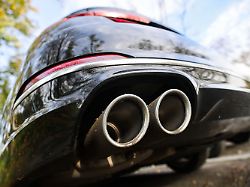Dispute over new EU emissions standard
Wissing: That’s why I reject Euro 7
06/09/2023 08:57 am
The plans for the new Euro 7 emission standard are causing a dispute in the traffic light coalition. While Environment Minister Lemke is in favor, Transport Minister Wissing is stepping on the brakes. His reasons: Euro 7 is expensive for manufacturers and customers.
Federal Transport Minister Volker Wissing spoke out against the planned EU emission standard Euro 7. “We should ensure that more money is invested in climate-neutral drives and affordable mobility offers,” said the FDP politician ntv.de. According to the minister, the benefits for environmental protection and health are small. “When an investment as big as Euro 7 brings such a small advantage, it is obvious not to touch it. That’s why I reject it.” Federal Environment Minister Steffi Lemke from the Greens, on the other hand, is urging the emission standard to be launched quickly.
The Euro 7 emissions standard is scheduled to come into force in 2025. In November, the EU Commission made proposals to revise the limit values for pollutants such as nitrogen oxides. What is new is that in the future, pollutants such as fine dust from tire abrasion and braking are to be regulated. This means that electric cars and hydrogen vehicles would also be affected by the rules. EU states and the European Parliament still have to negotiate the project and agree on a common line.
Wissing told ntv.de: “In any case, it is a regulation that slows down climate protection and makes mobility more expensive. If the car industry is forced to invest considerable sums in combustion engines, there is no money for electromobility and other climate-neutral mobility offers. That’s why many transport ministers hold in Europe this regulation is a fatal mistake. Me too.” And further: “It doesn’t make sense to force manufacturers to invest in fossil combustion engines when we actually want to phase out fossil fuels.”
Euro 7 will also make mobility more expensive. “I’m concerned about how we can take people with us in this transformation process. How can we ensure that mobility remains climate-friendly and affordable? Euro 7 only makes it all more difficult.”
The Ministry of the Environment is in charge of the project. However, if the federal government cannot agree on a common line, Germany would probably have to abstain from a possible vote among the EU states. Since other EU countries have already announced opposition to the project, a majority is currently not in sight.
In a joint position paper, Italy, France and six eastern EU states openly voiced their criticism of Euro 7. It states, among other things, that all new emissions regulations, including new emission limits for cars and vans, should be scrapped.
